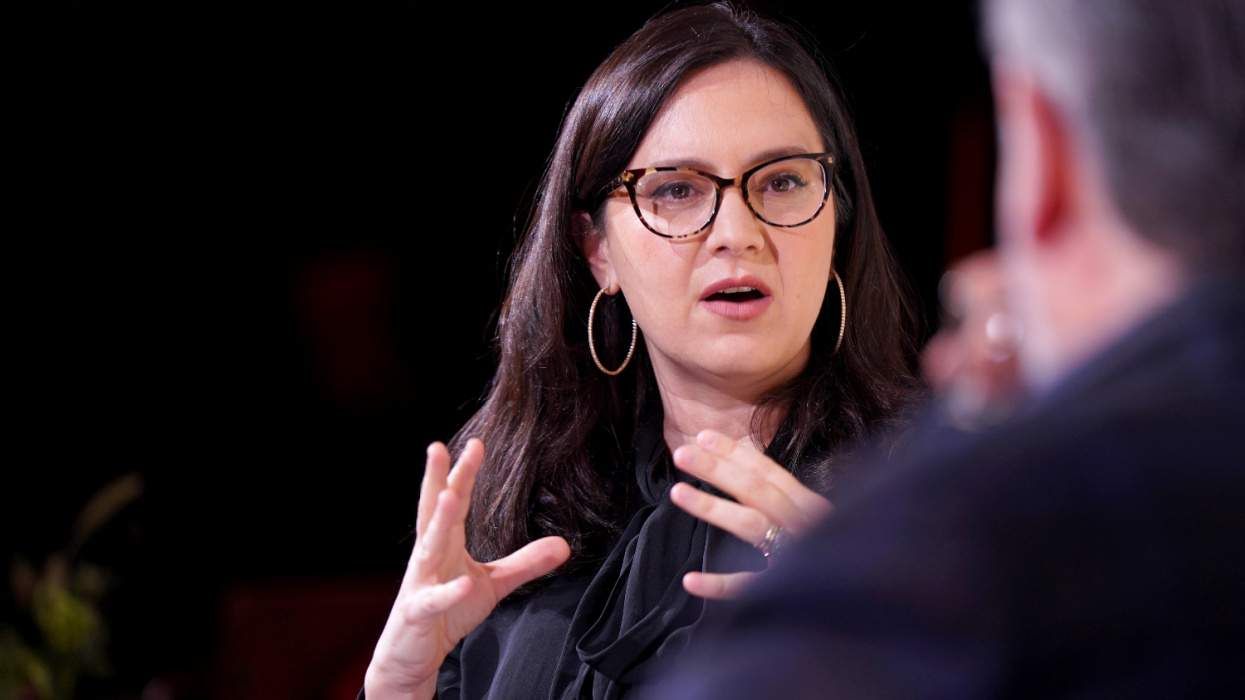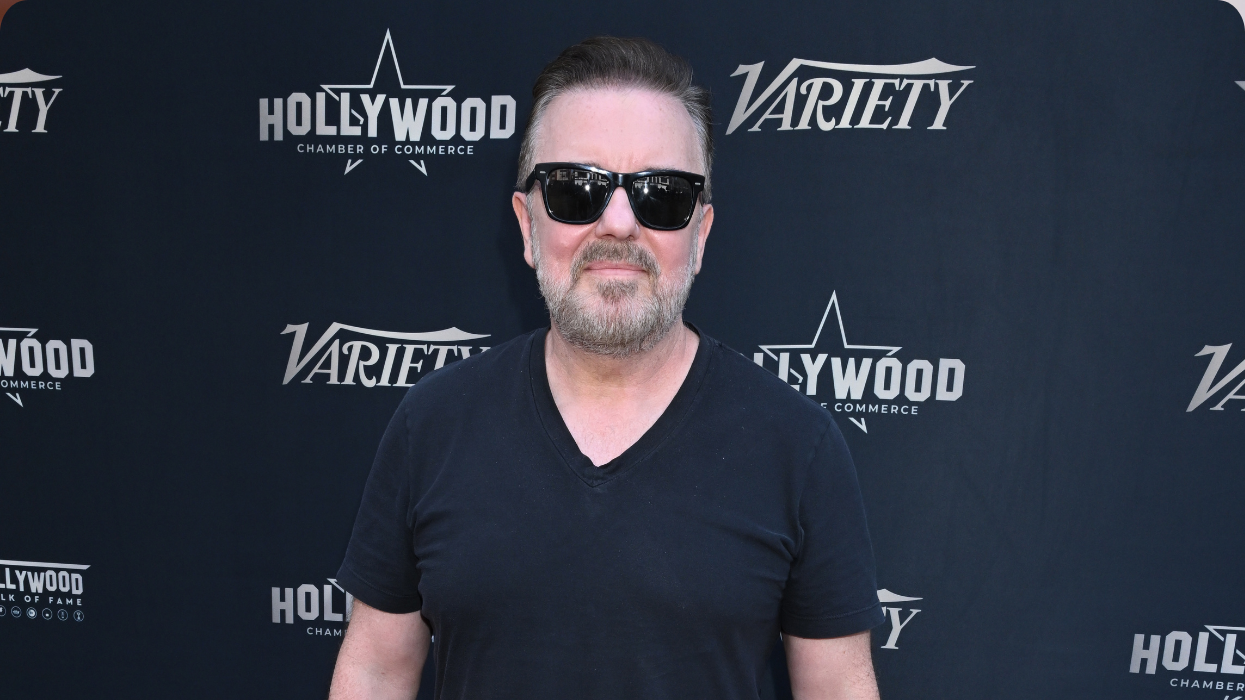We all know Katharine Hepburn was the woman who wore the pants. But was her iconic embodiment of the independent-spirited American woman really a carefully cultivated image that masked something else?
"I would consider 'transgender' a better way to understand Katharine Hepburn than anything else," says out novelist and Hollywood historian William J. Mann. His latest biography, Kate: The Woman Who Was Hepburn (Henry Holt and Co., $30), explores with unprecedented frankness the star's fluid sexuality and gender identification. Mann sheds new light on Hepburn's complex relationships with gay or closeted bisexual men, including her legendary love, Spencer Tracy--who, Mann reveals, was at least bisexual in terms of his sexual attractions and interactions.
When Kate was excerpted in the October issue of Vanity Fair, revealing that Tracy had enjoyed the paid favors of a male gas station attendant and that Hepburn's love life included several female lovers, a flurry of headlines screamed that Tracy and Hepburn were bisexual.
That label, according to Mann, isn't a useful prism through which to understand either star, but it especially short-changes Hepburn. "People ask, 'Was she bisexual? Was she lesbian?' " Mann says. "Those conversations aren't helpful. The best way to understand her is to look at her relationship with her own gender and the way she never felt comfortable as a woman."
Hepburn herself said as much during her lifetime. "She told [talk-show host] Dick Cavett, 'I am a missing link' between the genders," Mann says. "She knew somehow that she wasn't a woman the way a woman ought to be. She had a woman's body but felt in her heart and soul that she was a man. Everyone says, 'Oh, we already know that--she was a liberated woman who rebelled against traditional roles for women!' But I think it went deeper."
Mann explains: "You need to go back to her childhood and the invention of her alter ego, Jimmy [whom Hepburn created at age 10 when she decided she really was a boy]. Boys are what mattered to Dr. Hepburn," Mann says of the star's adored and much mythologized father. This was the standard against which Kate had to compete. "Her own gender issues--which I believe were congenital and didn't evolve out of her rivalry with her brother--were exacerbated by this. They got stronger. She couldn't understand why Daddy paid so much attention to Tommy and coached him in boat races and somersaults and tree climbing and not her."
According to Mann, Why not me? I'm a boy too! was young Kate's inner refrain. "It was as though she were saying, 'OK, I can understand if you don't want to let girls do that, but I'm not a girl.' That's why she shaved her head and called herself Jimmy.
"I remember when the light came on in my head," Mann says of the realization that there was more to Hepburn than anyone had guessed. "Everything fell into place like dominoes. In some ways, after Tommy died, Kate became [her father's] favorite. She grew up to be her father's kind of man rather than her mother's kind of woman."
During the exhaustive research for Kate, the biographer read a copy of Hepburn's unproduced autobiographical screenplay, written in 1987, titled Me and Phyllis. The screenplay has never been available to the public, and Mann didn't quote it because Hepburn's estate owns the rights.
"It describes her in terms you understand," Mann says: " 'I'm still Jimmy Hepburn in my heart and my soul.' Kate once told Barbara Walters, 'Fifty years ago I put on pants and walked the middle road.' She's said many times, 'I've lived my life as a man.' " Similarly, she told columnist Liz Smith that she had never related to the world as female. "She was telling us, in her own words, 'I am not what you think I am,' " Mann says.
Even now, only the gay press seems to have the vocabulary to discuss Hepburn's true sexual identity, Mann observes. "The reviews in the U.K. asked why I didn't just come out and say she was bisexual," he says. "They didn't understand why I didn't use that term. It's because I don't think it tells us enough about Katharine Hepburn. You can describe her activity as bisexual, but she certainly would never have thought of herself in those terms."
She wouldn't have answered to "lesbian" either: Hepburn's longtime friend and early mentor, the aristocratic Laura Harding, felt that lesbian did not describe them. "The word lesbian in that era denoted a very mannish, degenerate, man-hating, lower-class woman," says the author. "A lot of this was also a class issue. Kate and Laura were both upper-class women, and words like lesbian didn't fit them."
To understand Spencer Tracy's sexuality, on the other hand, Mann urges people to consider the type of repressed gay man portrayed in Brokeback Mountain. "In the 1930s homosexuals on the screen were all flipping pansies, and Tracy said, 'That's not me! I'm married!' And he just could never integrate that into his life. He was best friends with George Cukor, but he didn't want to be like George Cukor. My own gut feeling is that he was homosexual, and probably quite torn up about that, which is why he drank. At the same time, he had sexual relations with women, so he was bisexual in behavior. People use that as an example: 'See? He's not all gay!' "
Nor was the celebrated Tracy-Hepburn romance a fiction. Like everything else in her life, it was more complicated than that.
"It was devoted and at times passionate," Mann says. "It started out as a love affair, at least on Kate's part. I don't know if he fell in love with her the way she fell in love with him. But I think, very early on, she began to say, 'This is an illusion. This isn't the kind of relationship my mother and father had,' which was her holy grail."
Like all of Hepburn's relationships with sexually conflicted men, Mann points out, "it worked well for both of them until the illusion became more apparent. The appeal for these men is that she treated them like men, which boosted their masculine identity, but she didn't demand sex from them. She played house with men who clearly had their own issues, but she knew [the illusion] was never going to last long. Jimmy needed to come out."
Hepburn's great love was not, in fact, Spencer Tracy but Laura Harding. "A friend of hers told me, 'If Kate had a great love of her life--other than herself--it would have been Laura. And I don't mean Laura was the great passion of her life. Her great passions were for men--men who, on some level, she wished she could be like. She admired masculinity a great deal. By choosing sexually conflicted lovers," Mann says, "she may have been subconsciously 'saving' them and restoring them to their proper state of manhood."
Mann's book notes that Hepburn identified with straight men, but it was only with women "that she could set Jimmy free and be herself; rare was the man who could tolerate such a paradigm." Later iconic images such as cutting logs and swimming in the icy waters of Long Island Sound off the Hepburn estate at Fenwick, according to Mann, were not necessarily merely images of an empowered woman; they may have been more akin to a man in a woman's body.
"She did do those things," Mann says of Hepburn's hardy antics, "but she wasn't doing them to 'empower women.' Women's issues were not her thing--women were almost another species. She happened to be living in a woman's body, but that's not how she saw herself."
Still, even the author cautions against applying 21st-century gender definitions too literally at the risk of setting up language paradigms that weren't available to women of Hepburn's generation.
"I don't mean to say that she was actively saying, 'I am a transgendered person,' " Mann notes. "I deliberately didn't use the word transgender in the book, because it implies something too contemporary. But at the same time, I think it's the only way to understand her."
Perhaps if she were growing up today, Hepburn might even have used the term herself. "I think that, had she lived in another time," Mann says, "she might have been open to that discussion."















